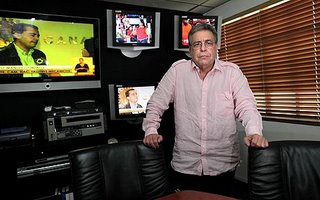Is silence consent? The Obama administrations engagement policy is convenient for Hugo Chavez's lates crackdown
Martin Luther King, Jr. (American Baptist Minister and Civil-Rights Leader. 1929-1968)
Sunday, May 24, 2009
WHILE THE United States and Venezuela's neighbors silently stand by, Hugo Chávez's campaign to destroy his remaining domestic opposition continues. On Thursday night state intelligence police raided the Caracas offices of Guillermo Zuloaga, the president of the country's last independent broadcast network, Globovision. They claimed to be looking for evidence of irregularities in the car dealership that Mr. Zuloaga also runs. In fact this was a thinly disguised escalation of an attack that Mr. Chávez launched this month against Globovision. The channel has been officially accused of "inciting panic," based on its accurate reporting of a mild May 4 earthquake in Caracas; under the regime's draconian media control law it could be shut down. Few doubt that that is Mr. Chávez's intent: Two years ago he revoked the license of the country's most popular television network after a similarly trumped-up campaign.
To recap: In February Mr. Chávez eliminated the limit on his tenure as president after a one-sided referendum campaign that included ugly attacks on Venezuela's Jewish community. Since then he has imprisoned or orchestrated investigations against most of the country's leading opposition figures, including three of the five opposition governors elected last year. The elected mayor of Maracaibo, who was the leading opposition candidate when Mr. Chávez last ran for president, was granted asylum in Peru last month after authorities sought his arrest on dubious tax charges. The National Assembly, controlled by Mr. Chávez, is considering legislation that would eliminate collective bargaining and replace independent trade unions with "worker's councils" controlled by the ruling party. Another new law would eliminate foreign financing for independent non-government groups.
This is hardly the first time that a Latin American caudillo has tried to eliminate peaceful opponents: Mr. Chávez is following a path well worn by the likes of Juan Perón and Alberto Fujimori -- not to mention his mentor, Fidel Castro. But this may be the first time that the United States has watched the systematic destruction of a Latin American democracy in silence. As Mr. Chávez has implemented the "third phase" of his self-styled revolution, the Obama administration has persisted with the policy of quiet engagement that the president promised before taking office.
"We need to find a space in which we can actually have a conversation, and we need to find ways to enhance our levels of confidence," Assistant Secretary of State Thomas A. Shannon Jr. said two weeks ago, echoing earlier remarks by Secretary of State Hillary Rodham Clinton. We have no objection to dialogue with Mr. Chávez. But isn't it time to start talking about preserving independent television stations, opposition political leaders, trade unions and human rights groups -- before it is too late?
© 2009 The Washington Post Company
Labels: Globovision, Hugo Chavez, Obama

